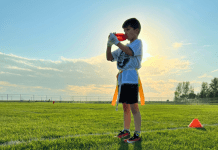“We are in the trophy generation. Give them a trophy for 23rd place. That makes the parents happy” – Tom Izzo
This may be becoming the motto of our generation.
Do kids in sports deserve to get a participation ribbon if they work hard? I think so, yes.
I get it, I have two girls who play sports. I want them to feel that working hard equals success, so give them the ribbon. But is this creating a generation of entitled kids? Should kids receive the same recognition despite whether they simply participate or really work hard for something?
The Value of Sports
Most parents want their kids to at least try sports, whether or not we were athletes ourselves, to put all their battery-powered energy to use. And also to learn valuable team-building skills.
Involving kids in sports has many benefits: they can learn to work as a team, increase self-esteem, social skills, friendships, motor skills and coordination, all while being physically active.
With the positive emotional and physical advantages that can be gained, it makes sense why we as parents want our children to participate in sports starting at a young age.
When Participation Isn’t Enough
However, as kids get older, sports get more competitive and just showing up and participating isn’t always enough. For example, a child could have played on a basketball or football team since they were in first grade. Now, he/she is in ninth grade now and needs to try out to make the team.
This is where the “participation ribbon” mentality comes into question. Competitive teams will choose competitive players. Players are chosen based on skill and effort, not simply because they show up to practice. And the reality is that not everyone gets a chance to play.
So how can parents help manage expectations?
Parents can encourage our children through wisdom and instruction. We can explain the reality of their situation: if you want to make the team in ninth grade, you need to practice on your own, not just during scheduled practices. You may need to lift weights, work on your footwork, and eat healthier. And the reality is, even if you do all those things, you still may not make the team.
Help your child set realistic expectations based on their personal skill and effort. While also encouraging them to put in the time and effort to further develop their skills.
As parents, we also need to understand how children feel about being chosen simply to fill the roster. When visiting with my friend last year, she talked about her teenage son, who was chosen to play on an advanced travel soccer team. She was frustrated when her son would only play for a total of only a few minutes each game. These games were out-of-state, the travel was depleting the family’s finances, and taking over their weekends. In speaking with the coach, he explained that her son’s role was to give his teammates (the more advanced players) a break.
As frustrating as it was for her as a parent, her son didn’t complain. He understood his role and wanted to be a part of the team.
Motivation & Effort
Sometimes when a kid is lacking in natural skill, they can make up for it in effort and determination. My friend’s daughter was cut from her high school volleyball team when she was in 10th grade. She was not going to accept that. She worked hard every day over the summer to get her name back on that roster. And she did.
But not every kid will have that drive. And as parents we have to be careful to not push our kids too much, or that could result in them turning away from the sport altogether. They need to find that motivation within themselves.
Open Discussions
In our home, we have begun to have short, only when-needed discussions about why certain athletes make the team, and stay on the team. We talk a lot about how attitude, hustle, and respect will be noticed. About how in some cases, having less athletic ability than a teammate, but thriving in other areas will also get your name on the roster.
And it might not be realistic to try to motivate a child by focusing on the possibility of receiving a scholarship. Only about 3% of women and men athletes who play high school go on to play in college.
Encouraging Our Kids
As parents we can provide opportunities for our kids to develop their skills. We can offer different camps or training options, but remember that the receptiveness falls on them. And in some situations, having your child attend with a friend or using a different instructor/facility could create a new or renewed interest in a particular sport.
It can also be good to have kids participating in more then one sport. Focusing on one sport does have its advantages, but the disadvantage could be huge. If the athlete has a sport-specific injury, it could end their career in that specific sport.
In the end, whether our child is the star of the team, just occasionally comes off the bench, or decides they don’t want to play a sport, we need to be their biggest cheerleader. Meet them where they are at, encourage them to work hard and develop their skills, but make sure everyone understand the realities of the sport world.
















